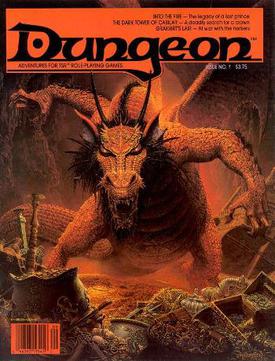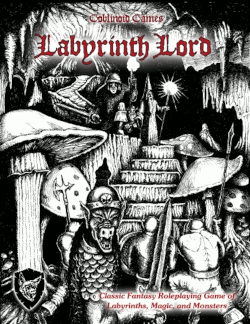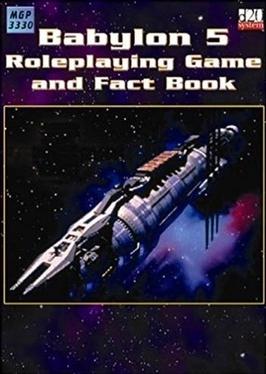
Dungeons & Dragons is a fantasy tabletop role-playing game (RPG) originally created and designed by Gary Gygax and Dave Arneson. The game was first published in 1974 by Tactical Studies Rules, Inc. (TSR). It has been published by Wizards of the Coast, now a subsidiary of Hasbro, since 1997. The game was derived from miniature wargames, with a variation of the 1971 game Chainmail serving as the initial rule system. D&D's publication is commonly recognized as the beginning of modern role-playing games and the role-playing game industry, and also deeply influenced video games, especially the role-playing video game genre.

Dungeon was one of the two official magazines targeting consumers of the Dungeons & Dragons role-playing game and associated products; Dragon was the other.

Wizards of the Coast LLC is an American publisher of games, primarily based on fantasy and science fiction themes, and formerly an operator of retail stores for games. It is currently a subsidiary of Hasbro, which acquired the company in 1999. During a February 2021 reorganization at Hasbro, Wizards of the Coast became the lead part of the new "Wizards & Digital" division.
The d20 System is a role-playing game system published in 2000 by Wizards of the Coast, originally developed for the 3rd edition of Dungeons & Dragons. The system is named after the 20-sided dice which are central to the core mechanics of many actions in the game.
Open gaming is a movement within the tabletop role-playing game (RPG) industry with superficial similarities to the open source software movement. The key aspect is that copyright holders license their works under public copyright licenses that permit others to make copies or create derivative works of the game.

Mutants & Masterminds is a superhero role-playing game written by Steve Kenson and published by Green Ronin Publishing based on a variant of the d20 System by Wizards of the Coast. The game system is designed to allow players to create virtually any type of hero or villain desired.
The Open Game License (OGL) is a public copyright license by Wizards of the Coast that may be used by tabletop role-playing game developers to grant permission to modify, copy, and redistribute some of the content designed for their games, notably game mechanics. However, they must share-alike copies and derivative works.
In the open gaming movement, a System Reference Document (SRD) is a reference for a role-playing game's mechanics licensed under the Open Game License (OGL) to allow other publishers to make material compatible with that game.

The Star Wars Roleplaying Game is a d20 System roleplaying game set in the Star Wars universe. The game was written by Bill Slavicsek, Andy Collins and J. D. Wiker and published by Wizards of the Coast in late 2000 and revised in 2002. In 2007, Wizards released the Saga Edition of the game, which made major changes in an effort to streamline the rules system.

Spycraft is a d20 and OGL-based role-playing game dealing with superspies and modern action. Originally published by the Alderac Entertainment Group (AEG), it is currently published under licence by Crafty Games.

Dawning Star is a science fiction role-playing game by Blue Devil Games built on d20 Modern and powered by d20 Future by Wizards of the Coast. It is the first full-scale campaign setting using the d20 Future ruleset. It is published under the Open Game License.
Paizo Inc. is an American role-playing game publishing company based in Redmond, Washington, best known for the tabletop role-playing games Pathfinder and Starfinder. The company's name is derived from the Greek word παίζωpaizō, which means 'I play' or 'to play'. Paizo also runs an online retail store selling role-playing games board games, comic books, toys, clothing, accessories and other products, as well as an Internet forum community.

Necromancer Games was an American publisher of role-playing games. With offices in Seattle, Washington and Coeur d'Alene, Idaho, the company specialized in material for the d20 System. Most of its products were released under the Open Game License of Wizards of the Coast.

Goodman Games is an American game publisher best known for the Dungeon Crawl Classics series of adventure modules and role-playing game, its science fiction offshoot Mutant Crawl Classics, and Original Adventures Reincarnated, a line of updated, annotated, and expanded republications of classic RPG adventures and supplements, mostly from TSR, Inc.'s Advanced Dungeons & Dragons. Additionally, Goodman Games produces RPGs using versions of the DCC rules for Fritz Leiber's Lankhmar and Jack Vance's Dying Earth settings, under license. The company has also produced licensed adventures for Wicked Fantasy Factory, Judges Guild, Xcrawl, Iron Heroes, Castles and Crusades, and Death Dealer.

Labyrinth Lord (LL) is a fantasy role-playing game written and edited by Daniel Proctor and published by Goblinoid Games. It emulates the rules and feel of Dungeons & Dragons (D&D) using the Open Game License (OGL) from Wizards of the Coast. LL is based on the 1981 D&D Basic Set edited by Tom Moldvay and its accompanying Expert Set by David "Zeb" Cook.
The Game System License is a license that allows third-party publishers to create products compatible with and using the intellectual property from the 4th edition of Dungeons & Dragons (D&D). It was released to the public by Wizards of the Coast (WotC) on June 17, 2008.

The Pathfinder Roleplaying Game is a fantasy role-playing game (RPG) that was published in 2009 by Paizo Publishing. The first edition extends and modifies the System Reference Document (SRD) based on the revised 3rd edition Dungeons & Dragons (D&D) published by Wizards of the Coast under the Open Game License (OGL) and is intended to be backward-compatible with that edition.
Owen K.C. Stephens is a game designer who has worked on a number of products for the Starfinder, Pathfinder and Star Wars Roleplaying Game and other games.

Eldritch Role-Playing System is a role-playing game published by Goodman Games in 2008.

The Babylon 5 Roleplaying Game is a role-playing game published by Mongoose Publishing in 2003.














